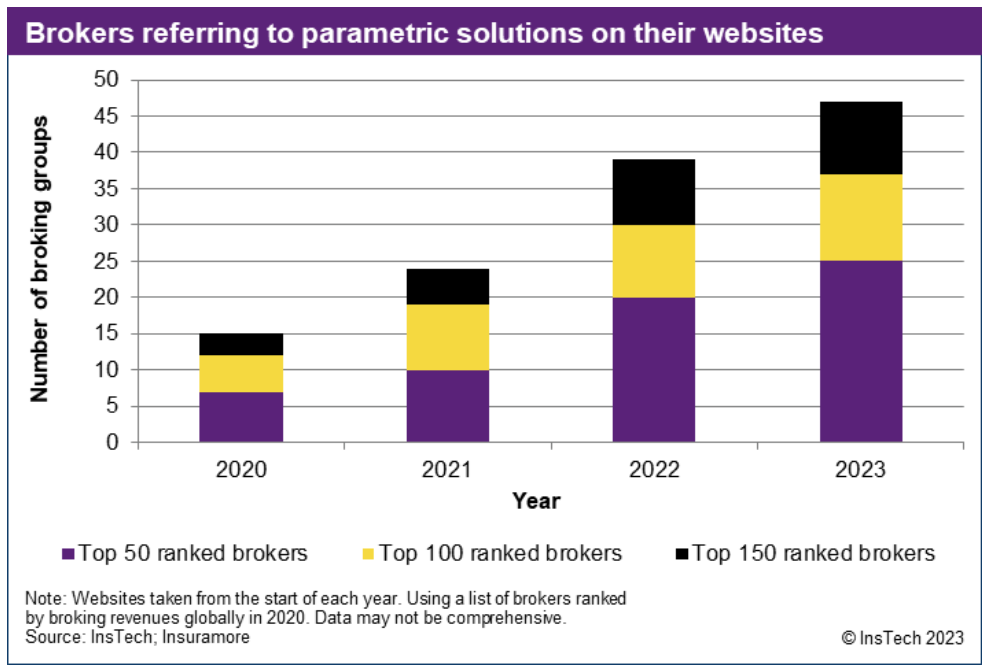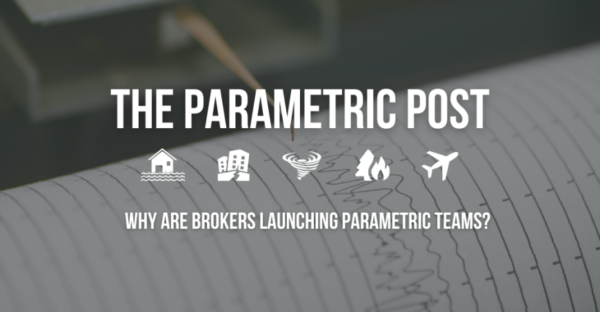The Parametric Post, the only newsletter dedicated to parametric insurance.
Thought for the day… why brokers are launching parametric teams
Commercial and public sector insurance and reinsurance is overwhelmingly sold through brokers and more of them are now promoting parametric products. In this week’s Parametric Post, Howden announces its new Climate Parametrics unit and start-up broker Augment Risk establishes a parametric division. We’ve previously reported on other brokers launching parametric teams. Several of the largest brokers now coordinate parametric activity either through a network of regional parametric leads or one or more dedicated teams with a parametric or alternative risk transfer focus.
Parametric solutions are well suited to covering risks where traditional insurance is not available or cover is insufficient. As the insurance market reduces underwriting capacity in certain risky areas, such as North American hurricanes and earthquakes, brokers need to help their clients identify alternative ways to transfer their risks. Meanwhile, organisations are increasingly aware of their exposure to non-physical losses, such as those related to their supply chain or footfall, that traditional insurance products do not cover. By structuring parametric solutions, brokers can help their clients be more protected.
 |
We conducted research earlier this year showing that nearly a third of the 150 largest global brokers now explicitly mention parametric solutions on their websites. If your company is an InsTech corporate member you can ask us which brokers are involved in parametric, or reach out if you’re not a member and would like to learn more. Reply to this email or contact us at [email protected].
A decade of insured losses: don’t just blame climate change
Climate • InsTech newsletter
Global economic losses from climate events are increasing annually by 5-7% on average. We explore the causes of this and the insurance and technology solutions helping to measure and protect against these losses. For more climate-related insurance news and insights, subscribe to InsTech’s monthly Climate Risk newsletter.
In the news…
Floodbase partners with ARC on parametric flood products
Africa • Flood
Floodbase has partnered with the African Risk Capacity (ARC), a multi-country risk pool, to develop and distribute parametric flood insurance solutions for smallholder farmers across Africa. The insurance products will be designed with pay-out thresholds based on Floodbase’s flood data.
CelsiusPro’s NDF contributes to $275m Morocco pay-out
Morocco • Earthquake
Morocco’s Solidarity Fund against Catastrophic Events is covered by a parametric earthquake reinsurance policy brokered by Gallagher Re and backed by more than 20 reinsurers. The UK government’s development minister says that the Natural Disaster Fund (NDF), a public-private partnership providing capacity for parametric disaster insurance, expects to contribute to a total pay-out of $275 million USD after the 6.8 magnitude earthquake on 8 September 2023. The Natural Disaster Fund is managed by Global Parametrics, which was acquired by parametric specialist firm CelsiusPro last month.
Munich Re offers health advice to pandemic policyholders
Pandemic
Reinsurer Munich Re, which provides indemnity-based and parametric solutions for epidemic and pandemic risk, has partnered with health security firm International SOS. Organisations that hold pandemic insurance policies from Munich Re will be able to access health advisory services from International SOS at any time, even before a pandemic is declared or a claim is made. Since parametric pandemic insurance only pays out when a number of triggers are met, usually including a pandemic declaration from the World Health Organisation, this could make the product more appealing. Organisations would be better equipped to manage risks during an unfolding pandemic before the conditions for a pay-out are met.
OneAdvent partner Augment Risk launches parametric unit
Reinsurance
Reinsurance broker Augment Risk, founded in 2023 and backed by $100 million USD in funding from private equity firm Altamont Capital Partners, has launched a global parametric specialty division. The team will be led by Kurt Cripps, who previously led Aon’s parametric weather risk unit. Augment Risk is an appointed representative of specialist broker and MGA services platform OneAdvent. The company says that it has placed over $1 billion USD of premium to the reinsurance market since its launch earlier this year.
Howden launches Climate Parametrics global practice
Climate
Broking group Howden has announced a new unit focused on covering climate risks with parametric solutions. The practice is led by Philipp Kusche, Global Head of Insurance Linked Securities (ILS) and Rowan Douglas, CEO Climate Risk and Resilience and brings together 30 individuals from Howden’s insurance broking, reinsurance broking and MGA businesses.
Parametric cyclone microinsurance launched in Samoa
Samoa • Cyclone
One of the parametric schemes Howden is involved in is the Pacific Insurance and Climate Adaptation Programme (PICAP) run by the United Nations Capital Development Fund. More than 1000 individuals are covered by PICAP’s parametric microinsurance in Fiji, Tonga and Vanuatu and it has now expanded to Samoa. Individuals can purchase coverage of $1000 WST ($357 USD) or $2000 WST ($714 USD) against tropical cyclones, with pay-outs triggered based on the category of the cyclone. SCOR is providing reinsurance capacity.
Munich Re backs derivative using new wind energy index
UK • Energy • Derivatives
Energy company Statkraft has entered into a parametric derivative transaction with Munich Re based on Speedwell Climate’s ‘Quality Factor’ index. Because wind farms generate power based on wind speed rather than demand, they are exposed to ‘shape risk’. This refers to the risk that renewable energy plants generate more power when the price of energy is low and less power when the price of energy is high, resulting in decreased revenue. This transaction, the first to use the quality factor index developed by Speedwell Climate and European Power Exchange (EPEX SPOT), enables Stratkraft to hedge against shape risk.
Weather derivatives are tradeable financial contracts that are used to hedge against weather risks. They are a form of parametric risk transfer, but unlike parametric insurance, weather derivatives are not regulated insurance products.
Weather derivatives surge with 230m active CME contracts
Derivatives
Reuters is reporting that weather derivative transactions are on the rise. Average open interest, a measure of the number of active contracts, in weather derivatives on the Chicago Mercantile Exchange (CME), has quadrupled since last year. At a peak earlier this year, 230,000 publicly traded CME weather derivative contracts were active. This excludes the weather derivatives and other parametric risk transfer contracts that are privately traded with reinsurers.
Parametric risk pools could buy reinsurance as a group
Climate • Reinsurance
Governments vulnerable to climate change and natural disasters in different parts of the world use parametric insurance to cover losses from tropical cyclones, earthquakes, droughts and other perils. Instead of purchasing parametric insurance directly from insurers and reinsurers, groups of governments set up multi-country risk pools. These risk pools (CCRIF in the Caribbean and Central America, ARC in Africa, PCRIC in the Pacific and SEADRIF in Southeast Asia) provide parametric insurance to governments, while each purchasing reinsurance from reinsurers.
By sharing and spreading risk, the multi-country risk pools can secure lower premiums than individual governments would achieve on their own. However, parametric catastrophe reinsurance in these exposed regions remains expensive, keeping the cost of cover high for the governments involved. At a recent meeting of the four risk pools, they decided to explore creating a joint reinsurance facility, which could lower the cost of reinsurance further and enable them to access capacity directly from capital markets.
CCRIF pays out $3.4m following Storm Philippe
Caribbean • Rainfall
The Caribbean Catastrophe Risk Insurance Facility (CCRIF SPC), which provides parametric catastrophe coverage to governments and public utilities in the Caribbean and Central America, has made two pay-outs following Tropical Storm Philippe. Philippe made landfall on Antigua and Barbuda on October 2nd and passed near the British Virgin Islands (BVI) on October 4th, causing heavy rains and flooding in both countries. CCRIF paid out a total of $3.4 million to the two countries after excess rainfall triggers were met.
Blockchain capacity backs REVO’s SME parametric products
Italy • Reinsurance • Blockchain
Insurer REVO is backed by capacity from start-up reinsurer Ensuro to provide parametric weather insurance to small and medium companies in Italy. Ensuro uses blockchain technology and cryptocurrency to provide a new source of capacity for parametric insurance products.
Find out what you’ve missed…
Issue 58 – Parametric insurance: not just for physical losses
Issue 57 – Parametric insurance: a growth opportunity for Lloyd’s?
Issue 56 – Consolidation in the parametric insurance market
Sign up here to receive the latest news, stories and insights on parametric insurance every two weeks.


